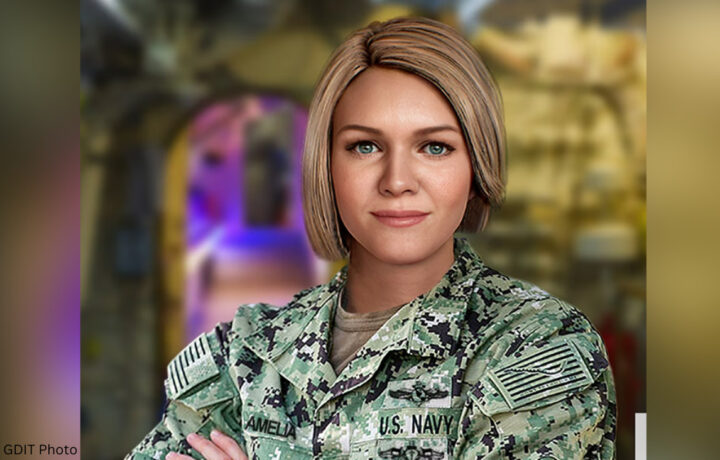“Amelia, what time is the enemy going to attack,” likely won’t be a question that sailors will be able to ask Amelia – an artificial intelligence (AI) assistance that the United States Navy is rolling out to help service members troubleshoot and revolve commonly asked tech-support questions.
General Dynamics Information Technology (GDIT) was awarded the Navy Enterprise Service Desk indefinite delivery and indefinite quantity contract at the end of 2021. The full rollout of the program is expected to be executed in August and is part of the Navy’s efforts to modernize and consolidate its more than 90 information technology (IT) help desks into a single, central node.
According to a report from C4ISRNET, it received a rendering of Amelia as a female sailor in “her” uniform. However, no explanations of the gender selection or name were shared.
A Colleague of Alexa? Not Quite
Amelia isn’t exactly a naval version of Amazon’s Alexa or Apple’s Siri. Instead of being an AI on a mobile phone or smart device, it will be cloud-based.
Sailors, Marines, and even civilians who have a common access card and who can be verified through the Global Federated User Directory will be able to contact Amelia via phone or text. The program should serve more than 1 million users with around-the-clock responses based on a depth of training and insider know-how. Additional applications, such as in a classified environment, could follow.
Where Amelia will be akin to Alexa and Siri is in how the AI has been designed to answer questions and complete repetitive tasks. It will also be able to sense frustration from users, and if Amelia isn’t able to answer a question or resolve a problem, it can forward the matter to a live agent. The idea is that Amelia could help slash the number of “abandoned calls” to a help desk.
“From my understanding, Amelia is part of a larger effort by the U.S. Navy to streamline tech support,” explained technology industry analyst Charles King of Pund-IT.
“That centralized service will address IT issues from simply lost password queries to complex data center processes,” King told ClearanceJobs. “The decision to incorporate AI in the help desk should significantly speed and simplify interactions for the Navy’s sizable number of personnel and massive data assets.”
AI Advancement
The Department of Defense (DoD) is already spending billions of dollars on AI advancement and adoption, and it could be applied to both the battlefield and the boardroom. Amelia seems to fall into the class of a Generative AI with an avatar front end, suggested Rob Enderle, technology analyst, and principal at the Enderle Group.
“General Dynamics has fielded this one, whose focus on defense typically means we don’t know much about the underlying technology,” Enderle told ClearanceJobs. “Given this is a support tool, the databases used to train it should be from trusted defense sources making it less likely the AI will be compromised, and any mistakes would come from the source material, which is also likely used in other forms and would be problematic even without this tool.”
Amelia could serve to address the Navy’s shortage of IT personnel and help unify a system that has greatly needed modernization. It can also be available at all hours, which is increasingly necessary as the sun never actually sets on the U.S. Navy, which has bases around the globe. It will also be able to direct more complicated queries to an actual human – something the civilian counterparts like Alexa and Siri really can’t do.
“AI work 24/7, never gets tired or mad, and never have personal issues that impact their performance,” added Enderle. “In short, they are ideal for first-level support but still need an escalation path, which this implementation has, to a real person when a question steps outside of their training. In short, this tool should have little, if any, downside risk but should better assure the operational capabilities of the military units that use it.”
A Real-World Cortana?
In some ways, Amelia could also be a step towards Microsoft’s Cortana, which began as in-game military AI in the video game Halo.
In this regard, Amelia has the promise to be a positive significant game changer in the face of a conflict because it could be distributed, significantly hardened, and made highly redundant, assuring those needing the tool have access to it in dire circumstances.
“Amelia is undoubtedly the future of military support, and the foundations made with this tool should evolve into fully automated repair facilities,” Enderle continued. “As AIs like this become better understood and more trusted, I expect they will evolve to become far more integrated with the military providing companionship for those on long solo missions, spotting when needed interfacing with observation technologies like drones and satellites, and ever more capable of directing individuals and teams towards their objectives or out of trouble. We are at the beginning of this AI trend; virtually everything we interface with will have been changed by the end.”
In the short term, Amelia could simply help an overburdened IT staff in the Navy, and be more personable than the current FAQ systems employed.
“Employing the Amelia interface could help to humanize the Navy’s help desk while also reducing the number of burdens on support staff members,” said King. “In a way, commercial AI entities, like Alexa, Siri, and ‘Hey, Google’ have helped pave the way for the Navy’s project. If it works as planned, I expect that over time Amelia will be joined by similar AI-enabled interfaces in DoD, government, and civilian settings.”




